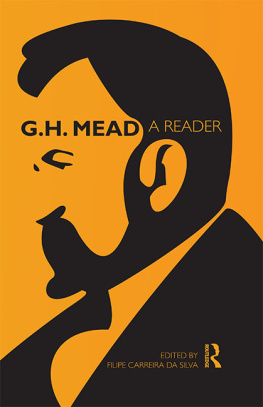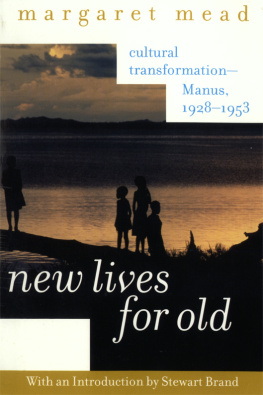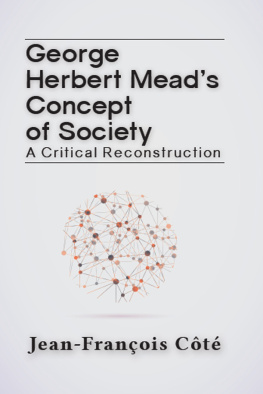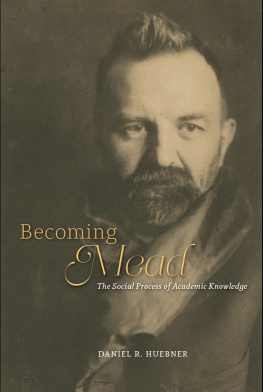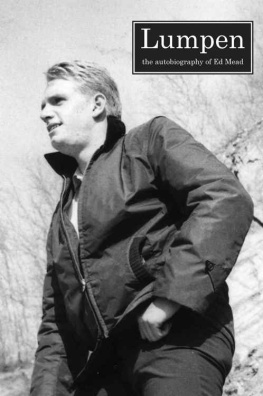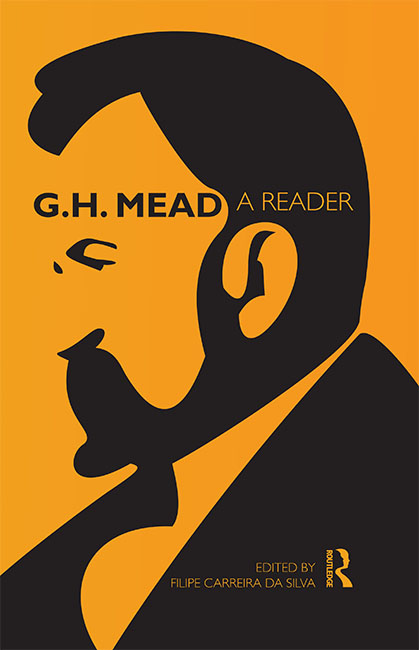Contents
This book introduces social scientists to the ideas of George Herbert Mead (18631931)one of the most original yet neglected thinkers of early twentiethcentury sociology.
Mead is an exceptional case among sociological classics in that, until now, there has been no comprehensive reader of his work. As the first one-volume, comprehensive edited collection of Mead's published and unpublished writing, this book fills this gap. It is the first to critically assess all of Mead writings and draw out the aspects that are central to his system of thought. The book is divided into three parts (social psychology, science and epistemology, and democratic politics), comprising a total of 30 chapters a third of which are published here for the first time.
G. H. Mead: A Reader provides a unique and timely contribution to the understanding of this key theorist. It is essential reading for both undergraduate and postgraduate students in the fields of sociology, social psychology, philosophy of social science, social and cultural anthropology, and social and political theory.
Filipe Carreira da Silva is a Research Fellow at the Institute of Social Sciences at the University of Lisbon, Portugal, and Senior Member of Wolfson College, University of Cambridge, UK. He is the author of Mead and Modernity: Science, Selfhood and Democratic Politics (2010 Distinguished Scholarly Publication Award, Section on the History of Sociology, American Sociological Association).
G. H. Mead
A Reader
G. H. Mead
Edited By
Filipe Carreira da Silva

First published 2011 by Routledge
2 Park Square, Milton Park, Abingdon, Oxon, OX14 4RN
Simultaneously published in in the USA and Canada
by Routledge
711 Third Avenue, New York, NY 10017
Routledge is an imprint of the Taylor & Francis Group, an informa business
2011 G. H. Mead; Filipe Carreira da Silva for selection and editorial matter
The right of the editor to be identified as the author of the editorial material, and of the authors for their individual chapters, has been asserted in accordance with sections 77 and 78 of the Copyright, Designs and Patents Act 1988.
All rights reserved. No part of this book may be reprinted or reproduced or utilized in any form or by any electronic, mechanical, or other means, now known or hereafter invented, including photocopying and recording, or in any information storage or retrieval system, without permission in writing from the publishers.
Trademark notice: Product or corporate names may be trademarks or registered trademarks, and are used only for identification and explanation without intent to infringe.
British Library Cataloguing in Publication Data
A catalogue record for this book is available from the British Library
Library of Congress Cataloging in Publication Data
Mead, George Herbert, 18631931.
[Selections. 2011]
G.H. Mead: a reader / [edited by] Filipe Carreira da Silva.
p. cm. (Routledge classics in sociology; 6)
Includes bibliographical references and index.
1. Mead, George Herbert, 18631931. 2. Social sciences Philosophy. 3.Social psychology. I. Silva, Filipe Carreira da. II. Title.
B945.M461S55 2011
191 dc22
2010040395
ISBN 978-0-415-55625-5 (hbk)
ISBN 978-0-415-55626-2 (pbk)
ISBN 978-0-203-86955-0 (ebk)
Typeset in Bembo
by Taylor & Francis Books
Acknowledgments
I must first thank Donald N. Levine for encouraging me to edit this anthology and for his unfailing support over the years. I would also like to extend my appreciation to the staff of the Special Collections Research Center at the University of Chicago, for their expert archival assistance: Daniel Meyer, Barbara Gilbert, Julia Gardner and Reina Williams, have all excelled at their job. I also owe a debt of gratitude to my editors at Routledge, Jennifer Dodd and Gerhard Boomgaarden, for their interest in the project and editorial advice. A word of thanks is due to Sue Birley, who helped me with the proofreading of the Introduction. I would also like to thank friends and family who have borne with me while this volume took shape: Mnica Brito Vieira and Sofia Aboim, my mother, grandmother and sister, whose encouragement and love have been so inspirational.
Introduction
The problems of social theory must be research problems.
G. H. Mead
George Herbert Mead is the only sociological classic who never wrote a book. In1911, he came close to publishing his first book. But at the last minute, with the galley proofs already in his hands, he changed his mind. He kept writing regularly for scientific journals, for edited books and newspapers, but he never himself wrote a book. Neither did he collect his numerous writings into book form. The implications of this circumstance were serious. For the most part, the texts that granted Mead a place next to Marx, Durkheim and Weber in the sociological canon were not written by Mead himself. Consider the famous Mind, Self, and Society (1934). The transcript that would later be used by Charles Morris to construct this volume is the work of a professional stenographer, W.T. Lillie, who was hired to record Meads offering of his popular social psychology course in the winter of 1928. The same is true of Move-ments of Thought in the Nineteenth Century (1936), based upon stenographic notes from a course with the same title. The Philosophy of the Act (1938) is not much different either. Only the Philosophy of the Present, based upon Meads Carus Lectures of 1930, can be safely attributed to Mead. These books, in particular Mind, Self, and Society, have been the entry-point to Meads ideas for every generation ever since. In a recent social theory reader, which included selections from over a dozen authors from Marx to Foucault, the only classic whose writings were not his own was Mead. It is nothing short of remarkable that almost 80 years after Meads death social scientists still lack a comprehensive volume that convey his ideas in the first person. This is what this anthology sets out to accomplish.

